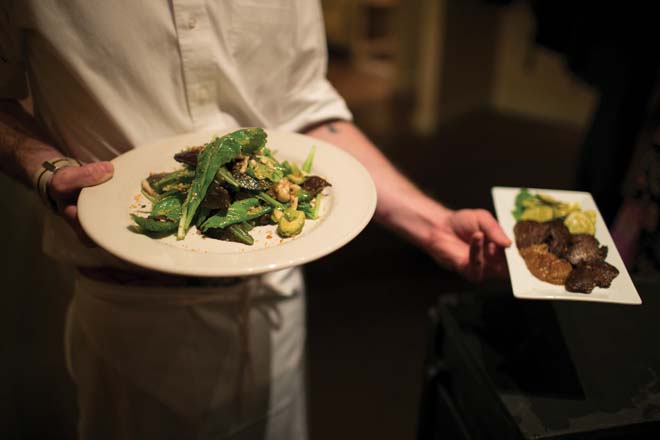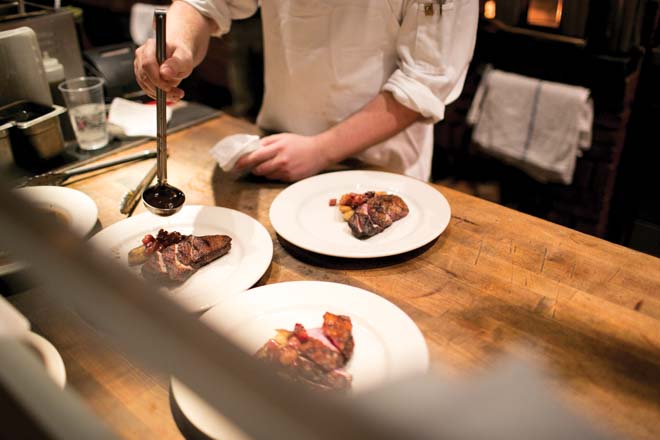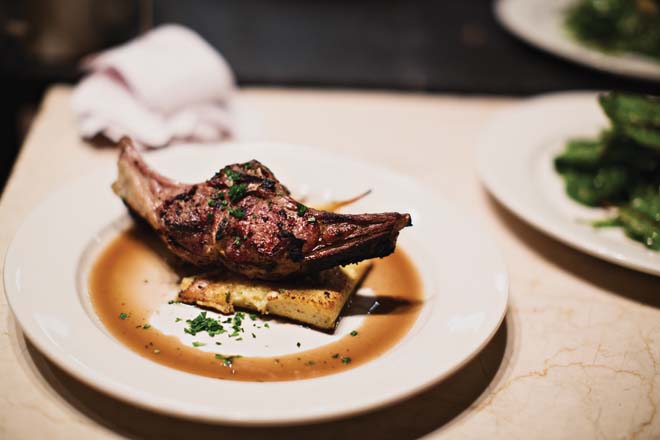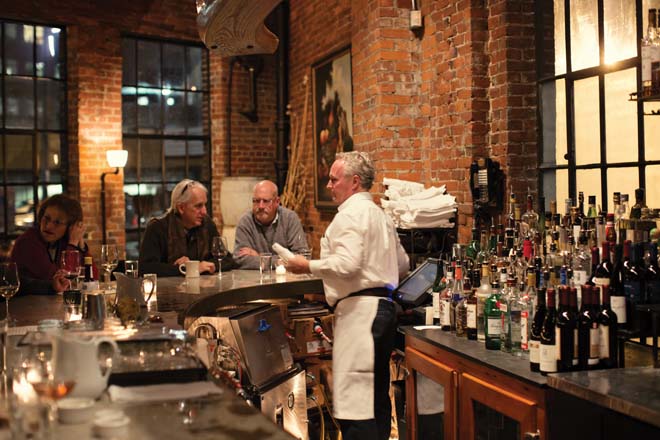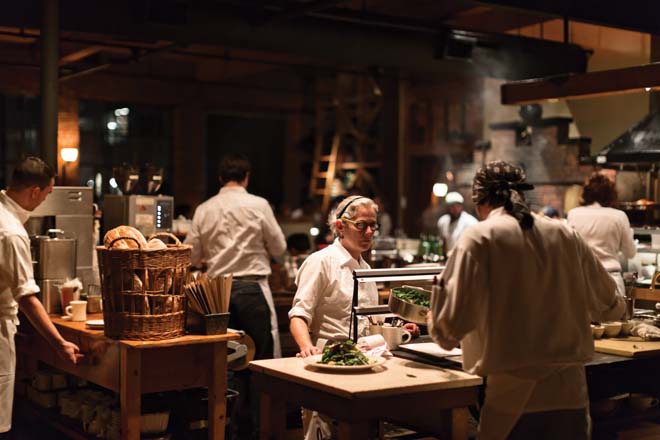Fore Street
After 16 years in operation, Fore Street continues to grow more captivating. If you happen to stroll by the restaurant around 4:15 on any given evening, you will observe patrons already starting to line up outside the doors, which open at 5:00. This is due in part to the restaurant’s well-known policy of holding a third of its seating for walk-ins, that is, those without a reservation. It is common knowledge that if you get in line, you will be able to eat there that very evening.
As parties are led through the dining room, across wooden floors constructed from old boxcars, they are treated to one of the most sensory restaurant experiences that the city has to offer. It is theater of sorts. A team of cooks works the large, hotter-than-hell brick oven while maneuvering a turnspit bearing luscious cuts of pork, chicken, and rabbit. Weathered copper-top tables around the perimeter of the room surround a view of a walk-in cooler filled with beautiful, vividly colored produce and a mountain of fresh oysters on ice, waiting to be shucked.
These are a few of the many elements of Fore Street that make customers feel good. As any veteran of the restaurant industry will tell you, it takes far more than delicious food to keep the crowds returning year after year. In fact, one of the most important factors is keeping the employees coming back as well, because behind every truly great restaurant is a strong relationship that has been built between the guests and those who serve them.
“Some people come in to simply enjoy the food, but most people who sit at a bar relish the social aspect of dining with strangers,” says Billy Flynn, who has tended bar at Fore Street for upwards of ten years. “Since I’ve worked Sundays for so long, I’ve gotten to know a lot of my clientele, developing friendships with everyone from award-winning directors to a man who was old enough to discuss what life was like both during and before Prohibition, going into detail about how they all drank milk drinks as it was the only way to ensure that the rotgut bathtub booze would stay down.”
A majority of repeat customers has a connection to Maine, but no matter where they come from it doesn’t take long before they are on a first name basis with Flynn, who is always game for talking shop. “I don’t consider myself a ‘great mixologist,’ as I have no interest in memorizing the ‘Mr. Boston’s guide to cocktails that nobody has ever heard of,’ but what I am good at is engaging the customer in some sort of interesting, if not memorable, conversation.”
In addition to building rapport with the diners, a cohesive crew is essential to overall efficiency. As server Lance Cromwell puts it, “Attention to detail is paramount: in the back of the house this begins with Sam Hayward, executive chef and part owner, and his overall gestalt and food philosophy that is woven through the very talented cadre of cooks and support staff. In the front of the house, this starts with owner Dana Street, the building and its rooms, and the various appointments for every level of servicewhich flows down through management, the hosts, servers, and bartenders.” For the guests, this means simple, well-prepared food at a relaxed pace. They remain blissfully ignorant of what goes into a well-orchestrated and seamless dining experience.
Mary Jane Johnson (M.J.) has been a server at Fore Street since one month after its opening, in 1996. “The practical reasons I stay here are really quite simple. I can make a decent living in a positive, upbeat work environment and have flexibility in my schedule. This allows me to pursue travel, gardening, poetry, and jewelry making. On a deeper level, I love the camaraderie among my coworkers, and am still very much intrigued by the leap into the unknown when approaching a new table of guests.”
As Johnson suggests, one of the factors that makes a position at Fore Street so desirable is that it is one of the most consistently lucrative restaurant gigs in Maine. Because the business is so successful, it offers its employees a support structure and sense of financial security that is uncommon in what is often a very unpredictable industry. But as someone who has spent a large portion of his life bartending and waiting tables, I can tell you that it takes more than just money to retain a skilled employee for ten years or more.
Another important attraction is, as Flynn puts it, “No lunches, no brunches, and no doubles. Those are the things that can tax even the most experienced servers. Nor would they even want to deal with that. The dinner shifts are busy enough as it is! A consistent schedule allows for easy planning of life outside of work.” This is especially beneficial to parents, as the flexibility and stability of the schedule often allows them to avoid arranging for daycare. It is also a boon to those who prefer to keep late hours and drink a lot of wine.
In the back of the house, chef de cuisine Nate Nadeau has found himself in a variety of stations over the past 11 years, starting at line cook. “Early on it was a whirlwind learning experience, when the restaurant was still relatively young and just starting to get really busy. As the years went on I continued to accept new responsibility and challenges, working alongside a very accomplished team. I was able to accumulate the kind of experience that most gain by having to work in several different kitchens, but all in one place.”
Even the storied rift between front and back of the house fostered by so many restaurant environments appears to be minimal. “I genuinely like and have great respect for the people I work with,” says 16-year-veteran bartender Mark Bay, who is also a special education teacher. “A lot of them have really fascinating lives outside of the restaurant walls. Nate does an incredible job running the line. He’s a really talented musician and it’s like he’s leading his band of cooks. He has this uncanny ability to improvise when I make a mistake, so my forgetting to order the vegetable side often goes unnoticed. Finally, even after all these years I still like to eat the food.”
In such a tight-knit crew, newcomers are under a considerable amount of pressure to fit in. “I would love to say that all of the new hires work out,” says Tina Fitzgerald Cromwell, a longtime server who has recently begun spending some of her time doing prep work in the back of the house, “but that just isn’t the case. Some people just don’t fit in, and this is definitely a self-policed floor at times. A lot of people can’t hack it, and they leave.”
At the end of the day, what makes Fore Street so different from its counterparts is the unyielding pride that employees take in their work. It is not an environment for those who prefer to cut corners, or those who are simply order-takers in search of a paycheck. There is an expectation that everyone will always pull his or her own weight, and this provides the continual challenge that makes the job worth doing.
“And,” Nadeau adds, “we have the best holiday party in town.”
288 Fore St. | Portland | 207.775.2717 | forestreet.biz






